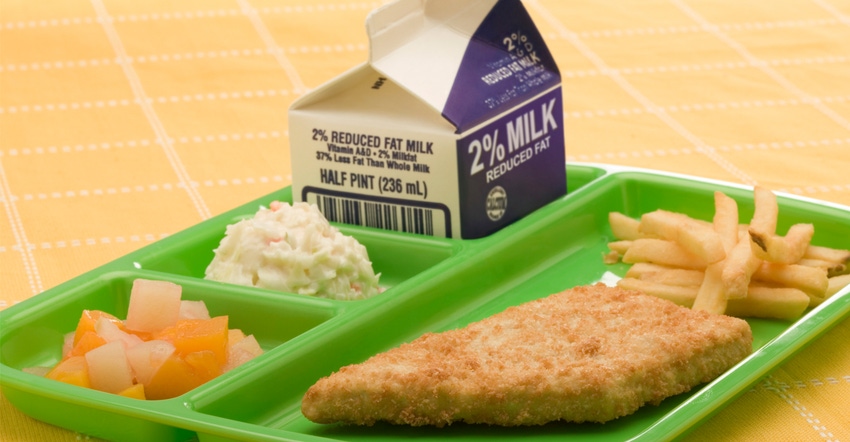January 7, 2022

The Farm to Table Task Force recently presented a set of recommendations to the state Legislature of Iowa. Commissioned in 2021 by the Legislature to identify strategies to improve the farm-to-table supply chain in the state, the task force had a special focus on increasing sales to institutional purchasers, including schools.
Task force members included 12 local food experts representing farmers, distributors, food pantries, small-scale processors and customers. In a release announcing the recommendations presented, John Lawrence, Iowa State University vice president for Extension and Outreach, notes that to "meet this charge, it was important to understand our state's challenges and strengths within the farm to table supply chain, to then be able to confirm priorities."
Staff from the Iowa Department of Agriculture and Land Stewardship and ISU Extension and Outreach also connected with additional partners across the state to listen and understand the challenges, successes and potential recommendations. The group started in September and in under four months, produced five key recommendations shared with the Legislature.
Recommendations include:
1. improving sales of local foods to institutions, including farm-to-school and early-care efforts, by increasing the efficiency of local food distribution and awareness of local options for institutional buyers
2. developing and supporting expanded processing opportunities for local foods
3. researching and increasing support for local food farming, and scaling up local food agriculture
4. revitalizing and expanding the Local Food and Farm Advisory Council
5. increasing the usage of the Farm to Food Donation Tax Credit, and exploring other food donation programs.
The full report is available for download.
Cow-calf drought recovering meetings
The ongoing drought is taking its toll on Iowa's cow-calf producers. To help deal with the crisis, three upcoming meetings specifically focused on livestock, crop and financial information are set. The 2022 Moving Forward After Drought series is hosted by ISU Extension and Outreach and set for Jan. 20, 24 and 25 at three locations.
The programs are free to cow-calf producers, but preregistration is required to assure adequate space and materials for attendees. You need only attend one meeting, as the same topics are included in all three.
Each program will focus on three key topics:
1. Gentry Sorenson, crop specialist with ISU Extension and Outreach, will lead a discussion on repairing pastures and establishing cover crops.
2. Beth Doran will provide a cow-calf outlook and benchmarking update, two topics key to financial stability or growth for producers.
3. The local Farm Service Agency director for each county will provide current information related to financial assistance available for cow-calf producers.
Mark your calendars to attend one of these sessions:
• Jan. 20. Iowa Lakes Community College Farm, Emmetsburg; 1-3 p.m. Preregister by Jan. 14 by calling 712-852-2865.
• Jan. 24. VFW Building, Estherville; 1-3 p.m. Preregister by Jan. 21 by calling 712-362-3434.
• Jan. 25. Community Building, Royal; 1-3 p.m. Preregister by Jan. 21 by calling 712-262-2264.
You can get more details in the program flyer.
Corn stover turned to natural gas
The Verbio Nevada Biorefinery has started turning corn stover into natural gas. The Nevada, Iowa, facility is moving that natural gas into an Alliant Energy pipeline that traverses central Iowa.
The plant uses anaerobic digesters to combine stover with livestock manure bacteria, which turns the material into biomethane gas that is equivalent to natural gas found in fossil fuels. The facility is in the beginning stages, with plans to expand in the coming months with the goal of providing enough renewable natural gas to heat 5,000 homes. Eight additional digesters are being built, with plans for more as the company begins to produce corn-based ethanol.
Kapil Arora, field agricultural engineer with ISU Extension and Outreach, explains that farmers in Iowa have been faced with the challenge of added stover due to rising corn yields. "Many do additional tillage just to get that stover to decompose and degrade," he says. "There has been a need to do something with that stover for many, many years."
Verbio employees harvest the stover from contracted fields, removing about 50% of the field material available. This reduces the need for tillage and allows some farmers to use no-till. Farmers are paid $8 per bale, and the equipment and labor are supplied by Verbio. The company contracted about 6,000 acres this year and hopes to expand to 30,000 acres in 2022.
You can learn more at verbio.us.
Source: Iowa State University. The source is solely responsible for the information provided and is wholly owned by the source. Informa Business Media and all its subsidiaries are not responsible for any of the content contained in this information asset.
You May Also Like




